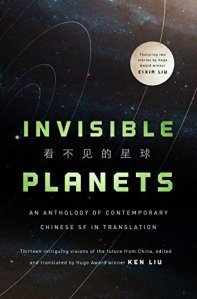Euro-centrism is something we should re-examine from time to time. In the same way that female empowerment and achievement is vital to society (50% of all humans are underrepresented in art, business, and political power), imagine dismissing the contributions of non-English writing to humanity’s literary whole. Yet that’s what we habitually do in the appreciation of Science Fiction. I’m definitely going to check out the Chinese Sci Fi mentioned is this prescient blog entry.
 There’s sometimes a tendency to think of science fiction as a uniquely or at least primarily Anglo-American phenomenon. During the 20th century, the most prominent sci-fi authors were either British or American. Moreover, they were, with a few exceptions, white males. Some writers, such as Ursula K. Le Guin, tried to incorporate non-Western philosophies like Taoism or Buddhism into their writing, but they were often the exception. Most sci-fi seemed firmly rooted in the Enlightenment. In the Oxford Handbook of Science Fiction, scholars discuss racial and gender diversity in the genre, but still tend to focus on British or American authors. With few exceptions, no non-English sci-fi story has made an appreciable impact on Western audiences.
There’s sometimes a tendency to think of science fiction as a uniquely or at least primarily Anglo-American phenomenon. During the 20th century, the most prominent sci-fi authors were either British or American. Moreover, they were, with a few exceptions, white males. Some writers, such as Ursula K. Le Guin, tried to incorporate non-Western philosophies like Taoism or Buddhism into their writing, but they were often the exception. Most sci-fi seemed firmly rooted in the Enlightenment. In the Oxford Handbook of Science Fiction, scholars discuss racial and gender diversity in the genre, but still tend to focus on British or American authors. With few exceptions, no non-English sci-fi story has made an appreciable impact on Western audiences.
View original post 466 more words
Update: I read the Three Body Problem by Liu Cixin, and thoroughly enjoyed it. Setting a story against the backdrop of the Cultural Revolution was a welcome change of pace. And the alien cultures and modes of thought introduced were very unique.